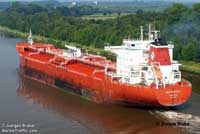
Photo: Juergen Braker
Just over a week ago we posted about the hijacking of the product tanker 45,000 DWT tanker, Mattheos I, with a crew of 23, off Benin in the Gulf of Guinea. Last Saturday, the ship and crew was released. No ransom was paid. The pirates stole as much of the diesel fuel cargo as they could and fled. One crew member was reported to be slightly injured, but otherwise the crew is said to be fine.
Why is piracy inthe Gulf of Guinea so different from piracy off the coast of Somalia?
As reported by the New York Times: Michael G. Frodl, the founder and head of C-LEVEL Maritime Risks, a Washington-based risks consultancy that advises maritime industry interests, said the rise in Gulf of Guinea piracy also reflected a general increase in economic misery, as well as the role model created by successful Somali pirate groups, who have been able to exact millions of dollars in ransoms from shippers.
In Somalia, Mr. Frodl said, pirates can act with far greater impunity because there is basically no government in that country. The one thing that’s going to hold back the development of a ransom model in Western Africa is the fact that these coastal countries still have law and order, and it’s going to be hard to hold on to a ship for more than a few days,” he said.
With no place to keep the ship or the crew the pirates focus on stealing the cargo as quickly as possible. As reported by the Africa Review:
The chief of staff of Benin’s navy, Commander Ferdand Ahoyo, says that piracy in the gulf is a growing and costly problem in the region.
“After hijacking a tanker, the pirates, conscious of the fact that most of West African coastal countries don’t have enough equipment to go out at sea, would position an empty tanker around 200 km from the coast and when they succeed in hijacking a fully-loaded tanker, they would pump the crude oil out of it into the empty tanker and then abandon the attacked one.
“Then later they will sell this oil along the coast to buyers who don’t always know where it’s coming from,” said Commander Ahoyo, adding that this is why it is important all countries along the coast keep a careful eye on exchanges made in the framework of oil trade in the region.
